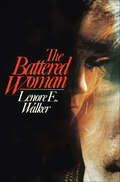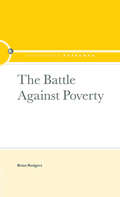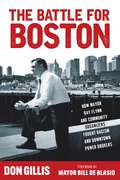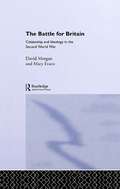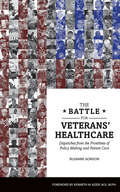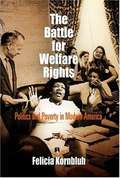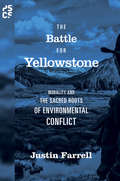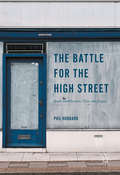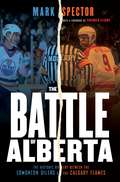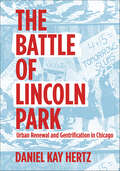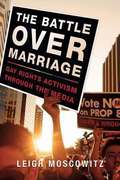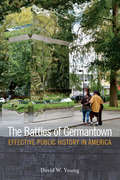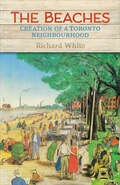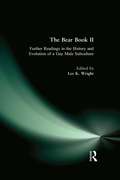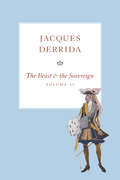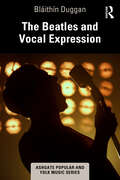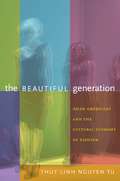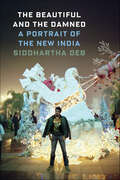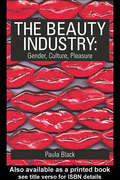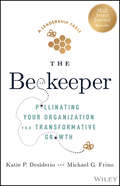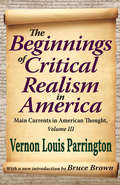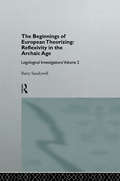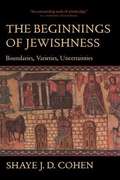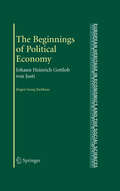- Table View
- List View
The Battered Woman
by Lenore E. Walker"A major contribution to this subject. She is thorough, practical, compassionate, and authoritative. It is a reading must."--Phyllis Chesler
The Battle Against Poverty (Routledge Library Editions)
by B RodgersFirst Published in 2005. Routledge is an imprint of Taylor & Francis, an informa company.
The Battle for Boston: How Mayor Ray Flynn and Community Organizers Fought Racism and Downtown Power Brokers (Polis: Fordham Series in Urban Studies)
by Don GillisHow Mayor Ray Flynn’s leadership and a coalition of activists transformed Boston, challenging established powers and setting new precedents for urban governance The Battle for Boston captures the remarkable era under Mayor Ray Flynn, whose election in 1983 marked the beginning of a profound shift in the city’s political and social landscape. Don Gillis, a Flynn senior advisor, chronicles the inspiring journey of a city that dared to challenge the entrenched power brokers—including developers, landlords, and banking industry leaders—through powerful grassroots campaigns.Gillis provides a vivid portrayal of the political dynamics and the coalition of community organizers, neighborhood leaders, and residents that played a pivotal role in rejecting the business-backed growth machine and the city’s historically divisive racial politics. This book charts the strategic battles fought within the corridors of power and on the streets and highlights the substantial impact these movements had on the city’s governance and power dynamics.In a historic turn, in 2021, Michelle Wu became the first woman, person of color, and Asian- American elected Mayor of Boston. Wu’s victory on a similarly progressive platform as Flynn underscores the enduring relevance of his legacy, signaling a hopeful future for more inclusive and effectively governed cities.The Battle for Boston poses a critical inquiry: Can cities truly embrace progressivism and govern effectively in the twenty-first century? This qualitative narrative study is a testament to the possibility of such governance, driven by the indomitable spirit of those who strive for a fair and equitable society.
The Battle for Britain: Citizenship and Ideology in the Second World War
by David Morgan Mary EvansIt is generally accepted that Britain was held together during the second world war by a spirit of national democratic `consensus'. But whose interests did the consensus serve? And how did it unravel in the years immediately after victory? This well observed and powerfully argued book overturns many of our assumptions about the national spirit of 1939-45. It shows that the current return to right-wing politics in Britain was prefigured by ideologies of change during and immediately after the war.
The Battle for Tolmers Square (Routledge Revivals)
by Nick WatesFirst published in 1976, this book tells of the dramatic struggle between tenants’ groups, community associations, students, squatters, intellectuals, political parties, and property developers at Tolmers Square in north London. The author describes how property developers, interested only in maximising profits, attempted to redevelop the Tolmers area for offices, while the local authority, pressurised by local tenants and faced with a housing shortage, tried to redevelop for housing. This book is about the politics of central city redevelopment. Although this text focuses on one particular case study, the same processes operate in all cities where land is used as a commodity for financial speculation. By tracing the Tolmers case in detail, this text demonstrates the forces which operate in city redevelopment, and shows the affect which various forms of opposition can have.
The Battle for Veterans’ Healthcare: Dispatches from the Front Lines of Policy Making and Patient Care
by Suzanne GordonIn The Battle for Veterans' Healthcare, award-winning author Suzanne Gordon takes us to the front lines of federal policymaking and healthcare delivery, as it affects eight million Americans whose military service makes them eligible for Veterans Health Administration (VHA) coverage.Gordon’s collected dispatches provide insight and information too often missing from mainstream media reporting on the VHA and from Capitol Hill debates about its future. Drawing on interviews with veterans and their families, VHA staff and administrators, health care policy experts and Congressional decision makers, Gordon describes a federal agency under siege that nevertheless accomplishes its difficult mission of serving men and women injured, in myriad ways, while on active duty.The Battle for Veterans’ Healthcare is an essential primer on VHA care and a call to action by veterans, their advocacy organizations, and political allies. Without lobbying efforts and broader public understanding of what’s at stake, a system now functioning far better than most private hospital systems may end up looking more like them, to the detriment of patients and providers alike.
The Battle for Welfare Rights: Politics and Poverty in Modern America
by Felicia KornbluhThe Battle for Welfare Rights chronicles an American war on poverty fought first and foremost by poor people themselves. It tells the fascinating story of the National Welfare Rights Organization, the largest membership organization of low-income people in U. S. history. Setting that story in the context of its turbulent times, the 1960s and early 1970s, historian Felicia Kornbluh shows how closely tied that story was to changes in mainstream politics, both nationally and locally in New York City. The Battle for Welfare Rights offers new insight into women's activism, poverty policy, civil rights, urban politics, law, consumerism, social work, and the rise of modern conservatism. It tells, for the first time, the complete story of a movement that profoundly affected the meaning of citizenship and the social contract in the United States.
The Battle for Yellowstone: Morality and the Sacred Roots of Environmental Conflict
by Justin FarrellYellowstone holds a special place in America's heart. As the world's first national park, it is globally recognized as the crown jewel of modern environmental preservation. But the park and its surrounding regions have recently become a lightning rod for environmental conflict, plagued by intense and intractable political struggles among the federal government, National Park Service, environmentalists, industry, local residents, and elected officials. The Battle for Yellowstone asks why it is that, with the flood of expert scientific, economic, and legal efforts to resolve disagreements over Yellowstone, there is no improvement? Why do even seemingly minor issues erupt into impassioned disputes? What can Yellowstone teach us about the worsening environmental conflicts worldwide?Justin Farrell argues that the battle for Yellowstone has deep moral, cultural, and spiritual roots that until now have been obscured by the supposedly rational and technical nature of the conflict. Tracing in unprecedented detail the moral causes and consequences of large-scale social change in the American West, he describes how a "new-west" social order has emerged that has devalued traditional American beliefs about manifest destiny and rugged individualism, and how morality and spirituality have influenced the most polarizing and techno-centric conflicts in Yellowstone's history.This groundbreaking book shows how the unprecedented conflict over Yellowstone is not all about science, law, or economic interests, but more surprisingly, is about cultural upheaval and the construction of new moral and spiritual boundaries in the American West.
The Battle for the High Street: Retail Gentrification, Class and Disgust
by Phil HubbardThis book analyses the social and cultural status of high streets in the age of recession and austerity. High streets are shown to have long been regarded as the heart of many communities, but have declined to a state where boarded-up and vacant retail units are a familiar sight in many British cities. The book argues that the policies deemed necessary to revive the fortunes of high streets are often thinly-veiled attacks on the tastes and cultures of the working class. Policy-makers often promote boutiques, art galleries and upmarket cafés at the expense of some of the outlets frequented by less affluent populations, including betting shops, fast food takeaways, discount stores and bargain booze outlets. Highlighting the social and cultural roles that so-called 'dying' high streets continue to play in the lives of working class and disadvantaged populations, this book provides a powerful argument against retail gentrification, and a timely analysis of class conflict in austerity Britain. It will be of great interest to scholars of geography, social policy and cultural studies.
The Battle of Alberta
by Mark SpectorAn up-close look at the rivalry between the Calgary Flames and the Edmonton Oilers, told from the perspective of those that were there. Sports writer and on-air personality Mark Spector pays tribute to the province's hockey heyday with a unique blend of humour and homage. "I hated every single guy on the Oilers, 'cause they all hated me." --Tim Hunter, the Calgary Flames In the 1980s, the province of Alberta was home to the two best hockey teams in the NHL. Aptly dubbed "Death Valley" due to the sheer talent and ability of its players, the province not only begat rivalry with other NHL teams, but also sparked fierce competition within its own borders. Thus began The Battle of Alberta, the historic struggle between the Edmonton Oilers and the Calgary Flames. In The Battle of Alberta, veteran sports journalist Mark Spector presents homage to Albertan hockey, and the two teams that inspired one of the most bitter competitions in NHL history. Through exclusive interviews with coaches, trainers, and players, Spector provides an unbiased, often hilarious look at the brawls, the clashes, and the schemes. A chronicle of an unforgettable time in hockey history (filled with never-before-seen photographs), The Battle of Alberta is guaranteed to entertain fans and educate newcomers alike.
The Battle of Lincoln Park: Urban Renewal and Gentrification in Chicago
by Daniel Kay Hertz&“A brief, cogent analysis of gentrification in Chicago . . . An incisive and useful narrative on the puzzle of urban development&” (Kirkus). In the years after World War II, a movement began to bring the middle class back to the Lincoln Park neighborhood on Chicago's North Side. In place of the old, poorly maintained apartments and dense streetscapes, &“rehabbers&” imagined a new kind of neighborhood—a modern community that combined the convenience, diversity, and character of a historic urban quarter with the prosperity and privileges of a new subdivision. But as property values rose, longtime residents found themselves being evicted to make room for progress—and they began to assert their own ideas about the future of Lincoln Park. As divisions deepened over the course of the 1960s, debate gave way to increasingly violent demonstrations. Each camp became further entrenched as they tried to settle the eternal questions of city planning: Who is a neighborhood for? And who gets to decide?
The Battle over Marriage: Gay Rights Activism through the Media
by Leigh MoscowitzOver the past decade, the controversial issue of gay marriage has emerged as a primary battle in the culture wars and a definitive social issue of our time. The subject moved to the forefront of mainstream public debate in 2004, when San Francisco Mayor Gavin Newsom began authorizing same-sex marriage licenses, and it has remained in the forefront through three presidential campaigns and numerous state ballot initiatives. In this thorough analysis, Leigh Moscowitz examines how prominent news outlets presented this issue from 2003 to 2012, a time when intense news coverage focused unprecedented attention on gay and lesbian life. During this time, LGBT rights leaders sought to harness the power of media to advocate for marriage equality and to reform their community's public image. Building on in-depth interviews with activists and a comprehensive, longitudinal study of news stories, Moscowitz investigates these leaders' aims and how their frames, tactics, and messages evolved over time. In the end, media coverage of the gay marriage debate both aided and undermined the cause. Media exposure gave activists a platform to discuss gay and lesbian families. But it also triggered an upsurge in opposing responses and pressured activists to depict gay life in a way calculated to appeal to heterosexual audiences. Ultimately, The Battle over Marriage reveals both the promises and the limitations of commercial media as a route to social change.
The Battles of Germantown: Effective Public History in America (History and the Public #3)
by David W. YoungKnown as America’s most historic neighborhood, the Germantown section of Philadelphia (established in 1683) has distinguished itself by using public history initiatives to forge community. Progressive programs about ethnic history, postwar urban planning, and civil rights have helped make historic preservation and public history meaningful. The Battles of Germantown considers what these efforts can tell us about public history’s practice and purpose in the United States. Author David Young, a neighborhood resident who worked at Germantown historic sites for decades, uses his practitioner’s perspective to give examples of what he calls “effective public history.” The Battles of Germantown shows how the region celebrated “Negro Achievement Week” in 1928 and, for example, how social history research proved that the neighborhood’s Johnson House was a station on the Underground Railroad. These encounters have useful implications for addressing questions of race, history, and memory, as well as issues of urban planning and economic revitalization. Germantown’s historic sites use public history and provide leadership to motivate residents in an area challenged by job loss, population change, and institutional inertia. The Battles of Germantown illustrates how understanding and engaging with the past can benefit communities today.
The Beaches: Creation of a Toronto Neighbourhood
by Richard WhiteThe Beaches is one of Toronto’s best known and most admired neighbourhoods. It has no striking works of architecture or splendid public spaces, no must-see galleries or public institutions, and no associations with historic events or great celebrities – the sort of things that create neighbourhood reputations and draw visitors. It does, however, have an attractive character, and it is this character that Richard White seeks to understand, offering insights into how it came to be and why it has endured. With an eye to the broader historical context, The Beaches recounts the neighbourhood’s initial colonial settlement, its development as a lakeside recreational community in the late nineteenth century, its emergence as a streetcar suburb after 1900, its maturation in the 1920s and 1930s, its relative decline in the 1950s and 1960s, and its revival in the 1970s and beyond. Utilizing a wide range of archival records, including council minutes, plans of subdivision, newspapers, public land records, city directories, assessment rolls, and historical photographs – as well as the present-day landscape – The Beaches reveals the various forces, public and private, local and international, that shaped this cherished urban neighbourhood.
The Bear Book II: Further Readings in the History and Evolution of a Gay Male Subculture
by Les WrightHere is a serious discussion of an emerging gay subculture! Take another fascinating journey into the bear's den with the latest offering from Les Wright, author of The Bear Book. The Bear Book II will show you the contrast between the media image of the fun-loving, carefree bear man and the health, image, psychological, technological, and sexual concerns of bears living in the real world. A continuation of The Bear Book (1997), this study of typically big, hairy, and bearded gay men explores bears on a societal and personal level, giving a wide voice to bears of all ages, nationalities, and cultures. Among the topics The Bear Book II: Further Readings in the History and Evolution of a Gay Male Subculture discusses are: health concerns of bears bear body images self-esteem issues for bears physical and psychological bear attributes as portrayed in the media versus actual individual accounts social and sexual institutions in the bear community the role of the Internet in creating a global bear subcultureThe Bear Book II will help you to understand the life of a bear. This unique book, the only serious exploration of this topic, offers documentation of a subculture in the making, complete with subjective and analytical perspectives that support this example of postmodern cultural anthropology.
The Beast and the Sovereign, Volume II
by Jacques DerridaFollowing on from The Beast and the Sovereign, Volume I, this book extends Jacques Derrida's exploration of the connections between animality and sovereignty. In this second year of the seminar, originally presented in 2002-2003 as the last course he would give before his death, Derrida focuses on two markedly different texts: Heidegger's 1929-1930 course The Fundamental Concepts of Metaphysics, and Daniel Defoe's Robinson Crusoe. As he moves back and forth between the two works, Derrida pursuesthe relations between solitude, insularity, world, violence, boredom and death as they supposedly affect humans and animals in different ways. Hitherto unnoticed or underappreciated aspects of Robinson Crusoe are brought out in strikingly original readings of questions such as Crusoe's belief in ghosts, his learning to pray, his parrot Poll, and his reinvention of the wheel. Crusoe's terror of being buried alive or swallowed alive by beasts or cannibals gives rise to a rich and provocative reflection on death, burial, and cremation, in part provoked by a meditation on the death of Derrida's friend Maurice Blanchot. Throughout, these readings are juxtaposed with interpretations of Heidegger's concepts of world and finitude to produce a distinctively Derridean account that will continue to surprise his readers.
The Beatles and Vocal Expression (Ashgate Popular and Folk Music Series)
by Bláithín DugganThe Beatles and Vocal Expression examines popular song through the topic of paralanguage – a sub-category of nonverbal communication that addresses characteristics of speech that modify meaning and convey emotion. It responds to the general consensus regarding the limitations of Western art music notation to analyse popular song, assesses paralinguistic voice qualities giving rise to expressive tropes within and across songs, and lastly addresses gaps in existing Beatles scholarship. Taking The Beatles’ UK studio albums (1963–1970), paralinguistic voice qualities are examined in relation to concepts, characteristics, metaphors, and functions of paralanguage in vocal performance. Tropes, such as rising and falling intonation on words of woe, have historical connections to performative and conversational techniques. This interdisciplinary analysis is achieved through musicology, sound studies, applied linguistics, and cultural history. The new methodology locates paralinguistic voice qualities in recordings, identifies features, shows functions, and draws aural threads within and across popular songs.
The Beautiful Generation: Asian Americans and the Cultural Economy of Fashion
by Thuy Linh Nguyen TuSince the 1990s, young Asian Americans including Doo-Ri Chung, Derek Lam, Thakoon Panichgul, Alexander Wang, and Jason Wu have emerged as leading fashion designers. They have won prestigious awards, been chosen to head major clothing labels, and had their designs featured in Vogue, Harper's Bazaar, and other fashion magazines. At the same time that these designers were rising to prominence, the fashion world was embracing Asian chic. During the 1990s, "Asian" shapes, fabrics, iconography, and colors filled couture runways and mass-market clothing racks. In The Beautiful Generation, Thuy Linh Nguyen Tu explores the role of Asian American designers in New York's fashion industry, paying particular attention to how they relate to the garment workers who produce their goods and to Asianness as a fashionable commodity. She draws on conversations with design students, fashion curators, and fashion publicists; interviews with nearly thirty Asian American designers who have their own labels; and time spent with those designers in their shops and studios, on their factory visits, and at their fashion shows. The Beautiful Generation links the rise of Asian American designers to historical patterns of immigration, racial formation, and globalized labor, and to familial and family-like connections between designers and garment workers.
The Beautiful and the Damned: A Portrait of the New India
by Siddhartha DebThe Beautiful and the Damned presents an affecting, incisive portrait of the vast, fascinating, and incongruent country that is globalized India.Siddhartha Deb grew up in a remote town in the northeastern hills of India and made his way to the United States via a fellowship at Columbia. Six years after leaving home, he returned as an undercover reporter for The Guardian, working at a call center in Delhi in 2004, a time when globalization was fast proceeding and Thomas L. Friedman declared the world flat. Deb's experience interviewing the call-center staff led him to undertake this book and travel throughout the subcontinent.The Beautiful and the Damned examines India's many contradictions through various individual and extraordinary perspectives. With lyrical and commanding prose, Deb introduces the reader to an unforgettable group of Indians, including a Gatsby-like mogul in Delhi whose hobby is producing big-budget gangster films that no one sees; a wiry, dusty farmer named Gopeti whose village is plagued by suicides and was the epicenter of a riot; and a sad-eyed waitress named Esther who has set aside her dual degrees in biochemistry and botany to serve Coca-Cola to arms dealers at an upscale hotel called Shangri La.Like no other writer, Deb humanizes the post-globalization experience—its advantages, failures, and absurdities. India is a country where you take a nap and someone has stolen your job, where you buy a BMW but still have to idle for cows crossing your path. A personal, narrative work of journalism and cultural analysis in the same vein as Adrian Nicole LeBlanc's Random Family and V. S. Naipaul's India series, The Beautiful and the Damned is an important and incisive work.A Publishers Weekly Best Nonfiction BookA Globe and Mail Best Books of the Year
The Beauty Industry: Gender, Culture, Pleasure
by Paula BlackThe beauty industry is now a multinational, multi-million dollar business. In recent years its place in contemporary culture has altered hugely as salons have become not simply places to have your hair cut or your nails done, but increasingly sites of physical and even spiritual therapy. In this fascinating and nuanced study, Paula Black strips away many popular assumptions about the beauty industry, including the one that says it exploits people's insecurity by projecting an illusory beauty myth. The interviews in this book - both with the beauty industry's workers and its clients - reveal a far more complex and interesting picture, and, in their presentation, Black re-formulates many feminist debates around choice and constraint. The debates addressed include issues around the body; the construction and maintenance of gender identity; changing definitions of health and well-being; and labour processes.
The Beekeeper: Pollinating Your Organization for Transformative Growth
by Michael G. Frino Katie P. DesiderioPut yourself at the center of your team’s learning and growth In The Beekeeper, a team of renowned management and leadership professionals deliver an insightful and engaging exploration of what it means to place oneself at the core of learning and growth for the members of your organization. The story is told through the eyes of Catherine, the 43-year-old founder and owner of a rapidly growing business. You’ll follow her as she transforms the way she leads and inspires others, revolutionizing the culture at her company by learning from the people around her. The authors lead you through practical strategies and techniques you can implement immediately to achieve extraordinary results in your life and in your business. You’ll learn about: Taking a central and active role in the growth and maturation of your employees and leadership team members The author’s “Art of Learning to Be Proximal,” a strategy for placing yourself at the core of your company’s growth Methods for ensuring your team is putting people first and living your company’s mission and values An indispensable guide for founders, entrepreneurs, managers, and executives at growing companies, The Beekeeper will also earn a place on the bookshelves of company board members looking for ways to best contribute to their firm’s ongoing success.
The Beginnings of Critical Realism in America: Main Currents in American Thought (Main Currents In American Thought Ser.)
by Vernon ParringtonThis final volume of Vernon Louis Parrington's Pultzer Prize-winning study deals with the decay of romantic optimism. It shows that the cause of decay is attributed to three sources: stratifying of economics under the pressure of centralization; the rise of mechanistic science; and the emergence of a spirit of skepticism which, with teachings of the sciences and lessons of intellectuals, has resulted in the questioning of democratic ideals.Parrington presents the movement of liberalism from 1913 to 1917, and the reaction to it following World War I. He notes that liberals announced that democratic hopes had not been fulfilled; the Constitution was not a democratic instrument nor was it intended to be; and while Americans had professed to create a democracy, they had in fact created a plutocracy.Industrialization of America under the leadership of the middle class and the rise of critical attitudes towards the ideals and handiwork of that class are examined in great detail. Parrington's interpretation of the literature during this time focuses on four divisions of development: the conquest of America by the middle class; the challenge of that overlordship by democratic agrarianism; the intellectual revolution brought about by science and the appropriation of science by the middle class; and the rise of detached criticism by younger intellectuals. A new introduction by Bruce Brown highlights Parrington's life and explains the importance of this volume.
The Beginnings of European Theorizing: Logological Investigations: Volume Two (Logological Investigations Ser. #Vol. 2)
by Barry SandywellFirst published in 1995. Routledge is an imprint of Taylor & Francis, an informa company.
The Beginnings of Jewishness: Boundaries, Varieties, Uncertainties
by Shaye J. D. CohenIn modern times, various Jewish groups have argued whether Jewishness is a function of ethnicity, of nationality, of religion, or of all three. These fundamental conceptions were already in place in antiquity. The peculiar combination of ethnicity, nationality, and religion that would characterize Jewishness through the centuries first took shape in the second century B. C. E. This brilliantly argued, accessible book unravels one of the most complex issues of late antiquity by showing how these elements were understood and applied in the construction of Jewish identity--by Jews, by gentiles, and by the state. Beginning with the intriguing case of Herod the Great's Jewishness, Cohen moves on to discuss what made or did not make Jewish identity during the period, the question of conversion, the prohibition of intermarriage, matrilineal descent, and the place of the convert in the Jewish and non-Jewish worlds. His superb study is unique in that it draws on a wide range of sources: Jewish literature written in Greek, classical sources, and rabbinic texts, both ancient and medieval. It also features a detailed discussion of many of the central rabbinic texts dealing with conversion to Judaism.
The Beginnings of Political Economy
by Jürgen Georg BackhausThis volume contains eleven essays on Johann Heinrich Gottlob von Justi's concepts of the modern economy. These essays reflect both Justi's life and professional work, focusing on his ideas on economics and social sciences. Interesting are the aspects of his biography that gave rise to the development of his economic thought. Apart from Justi's personal background, this book contains the beginning of modern economics because Justi's philosophy was linked to government, labour, morality, health and finally the good society. Justi, throughout his life, had a dual career of being on the one hand a prolific writer and educator, on the other hand an administrator in the core state business of mining, then an important revenue source, and he typically combined the two. He gave two inaugural lectures in 1750 in front of Queen and Empress Maria Theresia. The lecture on cameral sciences is truly the beginning of modern economics: Justi was of the opinion that the happiness of the state would be increased if the number of happy and healthy persons would increase. For this reason, health was a major focus of his attention long before the advent of health economics. The main benefit the reader will derive from the book is an understanding of how economics developed as a separate science. Furthermore, they will see how Justi laid the foundation for policy sciences, the specialty of many schools of governement today.
